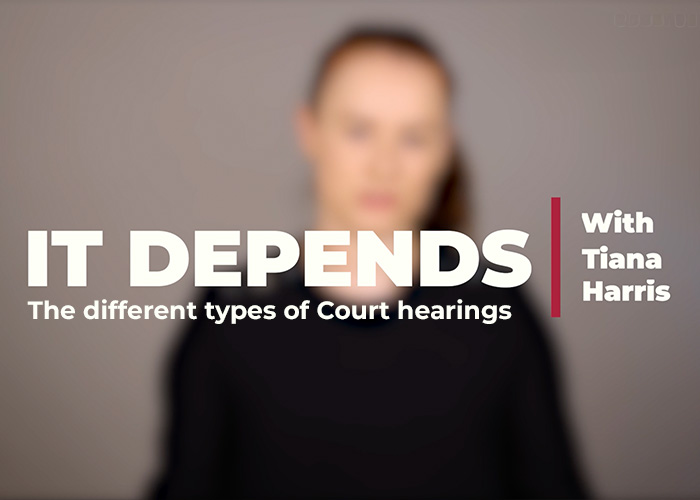In this edition of ‘It depends’, lawyer Tiana Harris talks about the different types of court hearings. From first return dates to directions hearings and interim hearings, Tiana guides us through each step.
Video transcript
Hi, I’m Tiana, and welcome to this edition of it depends. One of the most common questions I am asked by clients is what is a first return date? What is a directions hearing? What is an interim hearing? The answer to those questions, of course, is it depends.
What is a first return date?
A first return date is the first court event after you have filed your court documents and have commenced proceedings. A first return date is procedural in nature and is generally before a judicial registrar who will hear from the parties or their legal representatives about the steps that need to be taken to progress the matter forward. Orders will be made at the first return date, for example, that the parties exchange further disclosure, that they engage a single expert to value real property or chattels, or they attend an event with a court child expert or dispute resolution. Unless the matter is urgent, the first return date will be listed 1 to 2 months after the proceedings are commenced.
What is a directions hearing?
A directions hearing is another procedural hearing that is quite brief and are used throughout the proceedings to make orders or directions to move the matter forward. A directions hearing can also be called a mention and these terms are used interchangeably.
What is an interim hearing?
An interim hearing is quite important as it is a court event where a decision can be made about a particular issue in dispute on an interim basis, contained in an initiating application or a response to an initiating application. An interim hearing is usually before a judge or a senior judicial registrar who has the power to determine these issues. At the hearing, the judge or the senior judicial registrar, will usually consider the evidence before the court and any documents filed for the interim hearing, such as a case outline and they will hear submissions from both parties or their legal representatives. Any order made at an interim hearing will be in effect until the final hearing or until another order is agreed between the parties. For example, orders can be made at the interim hearing about where a child is to live and how much time they spend with the other parent. We therefore strongly recommend that parties obtain legal advice before an interim hearing, as any orders made can be in effect for several months to over a year. Sometimes after an interim hearing, the parties will be ordered to attend dispute resolution and for more information on this, please watch my previous video on this topic.
What is compliance and readiness hearing?
For matters that remain unresolved after dispute resolution and will proceed to a final hearing, the matter will be listed for a compliance and readiness hearing within six months of the date of filing or as close to this date as possible. The purpose of this hearing is to ensure that the parties have complied with any previous orders or directions and whether they are ready to proceed to a final hearing.
What is a final hearing?
If required the matter may be listed for further trial management hearing before a judge where any further directions may be made. The matter will then proceed to a final hearing before a judge, which may range from one day to several days, depending on the complexity of the matter. After the opening addresses, giving of evidence and submissions from each party, the judge will then make a decision and deliver their reasons for judgment. Sometimes the judgment is delivered on the final day of the hearing, or if the judge needs more time to consider, they will reserve that decision and deliver their judgment at a later date, usually within three months. Should you wish to discuss the court process in the context of your specific matter, please do not hesitate to contact me or one of the other family lawyers here at Cooper Grace Ward.







